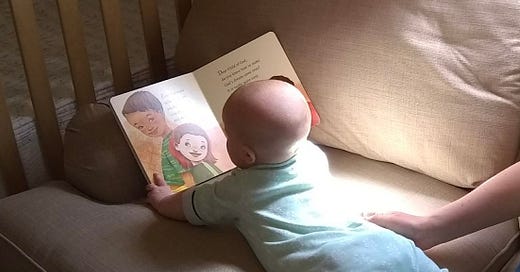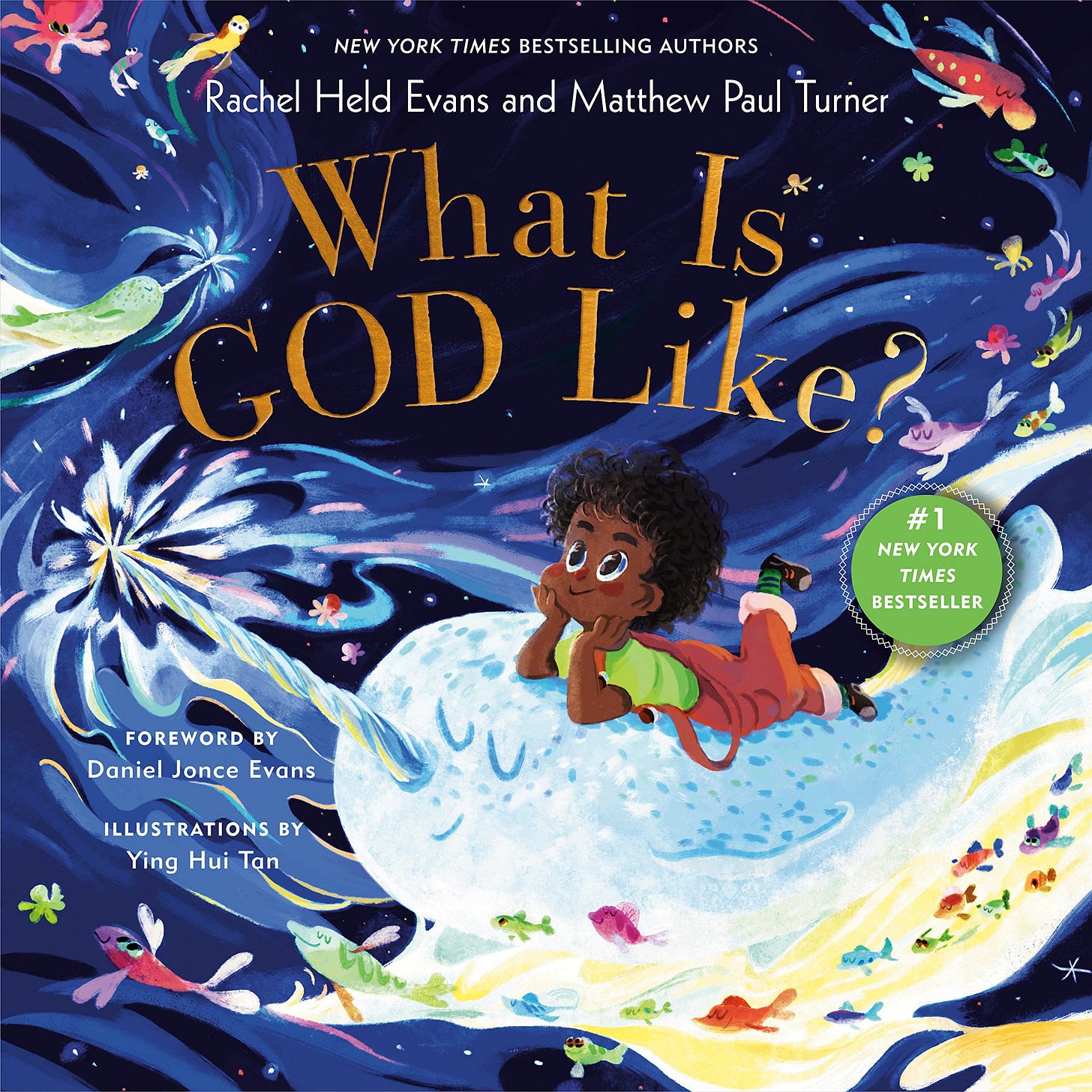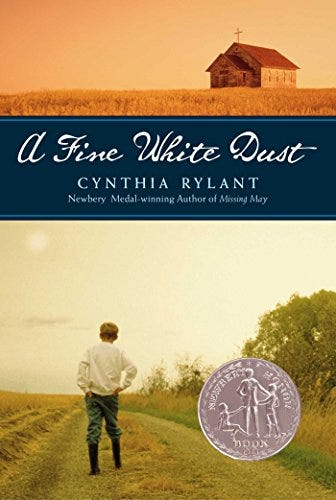Four Great Children's Books For Progressive Christian Families
It’s been a rough month to be a parent. We are reeling from the gun violence and tragedy that seems ever more ubiquitous, even as the likelihood of effective action seems further away. We rage at those in power who feel a greater duty to protect our freedom to purchase killing machines than to protect our children’s lives. As the parent of a daughter, it has been especially difficult to watch the past month’s political events, wondering what her level of safety and care will be once she starts going to school, once she becomes more independent, once she starts seeing an OB/GYN. And I haven’t even mentioned the millions of parents and children suffering from the shortage of formula.
There is so much to say, but in my case, it also feels like there is very little to say. In lieu of a political rant – which you can find in any number of places – I’m sharing my four favorite Christian children’s books in honor of the kids that we care about and worry for. These are all books that progressive Christian parents will feel good about reading to their kids, and that can spark healthy questions and rich conversations about God.
“God dreams that every one of us will see that we are all brothers and sisters – yes, even you and me – even if we have different mommies and daddies or live in different faraway lands. Even if we speak different languages or have different ways of talking to God. Even if we have different eyes or different skin.”
God’s Dream, by Archbishop Desmond Tutu and Douglas Carleton Abrams
This was the first religious book my daughter owned, since we received it as a gift before she was born. The corners of its cardboard covers are worn and rounded; before she could understand the story, she loved looking at the multi-colored children’s faces.
Tutu writes directly and sweetly to his child reader, asking them to think about their own dreams before telling them about the dreams of God: that all people will share with one another, care for each other, and understand that we are all God’s children. It has a simple message of equality, forgiveness, generosity, and love that is perfect for forming the smallest children’s first impressions of God. There is even a “peaceable kingdom” element as a dog and a cat who fight in the early illustrations become hugging friends by the end of the book.
“She is your protector. He is trustworthy. They are friends when you feel alone.
Whenever you aren’t sure what God is like, think about what makes you feel safe, what makes you feel brave, and what makes you feel loved. That’s what God is like.”
What Is God Like, by Rachel Held Evans and Matthew Paul Turner
This picture book is the vision of the late Rachel Held Evans, one of today’s most influential progressive Christian writers who tragically died in 2019 at the age of 37. Matthew Paul Turner, a great author of Christian picture books in his own right, realized her vision by using her ideas to posthumously publish this book to help children understand the concept of God.
What Is God Like is less about what God wants or what God has done, and more about how God relates to us and makes us feel safe, brave, and loved. There is a lovely, divine gender fluidity here in both words and pictures: God is like both a mother and a father, like a shepherd who guards her sheep, and like three dancers who are pictured with different genders and skin colors.
I love this book’s way of describing God to my child, especially when so many “kid-friendly” Bible stories (Noah’s ark, Adam and Eve, Jonah and the whale) depict a God whose main interactions with people involve orders followed by reward or punishment. While those tales should still be told – they are a part of our faith story – What Is God Like shows a God who is ever-present, “slow to get angry,” “quick to be glad,” and a source of comfort and care for each of us.
from “The First Sin:”
“God sighed. “I told you not to eat from that tree. Because you have done what I told you not to do, life will be difficult for you now. You will have to leave this beautiful garden and work very hard to get the things you need. Now you will know what it is to be unhappy. And someday, you will die. I made you from dust. When you die you will become dust again.”
God made some real clothes for Adam and Eve and sent them out into the big world. And God was with them everywhere they went.”
The Spark Story Bible, ed. Debra Thorpe Hetherington
We received this illustrated Bible as a gift from the pastor who baptized my daughter. I immediately liked the fun, colorful pictures and the adaptations of stories that are short and simple enough to read to a two-year-old.
However, I truly became a fan of this children’s Bible when I realized that, apart from the Father-Son relationship between Jesus and God, God is never gendered. As the parent of a daughter, I appreciate that her first exposure to Scripture will depict God as inclusive of all genders, rather than the “old man in the sky” image that so many of us grew up with.
While a few major parts of the Bible are skipped over – it ends with Paul’s letter to the Philippians rather than with Revelation – I was surprised at how much of the Bible it includes. The greatest hits of Sunday School are here, of course, but so are the stories of Naomi and Ruth, Jeremiah, Pentecost, and Tabitha.
The Spark Story Bible also handles difficult stories with grace and a New Testament vision of who God is. You can see in the quotation above how it deals with the story of Adam and Eve leaving Eden: while the consequences of the story are the same, God is more sad than angry, and God continues to be with them and care for them.
“One thing I see now that I couldn’t see last summer is that after the revival is over, the world is a place that isn’t anything like the inside of a church on a hot summer night. It’s a world where good guys like Rufus are happy atheists, and nice folks like my parents don’t care much about church, and spiritual people like me wander around on earth wishing it was heaven.”
A Fine White Dust, by Cynthia Rylant
A short chapter book for older readers, A Fine White Dust tells the story of Pete, a 13-year-old living in a small, rural town who is disappointed that his atheist best friend Rufus and his non-churchgoing parents don’t share his yearning for God. When a traveling preacher comes to town to hold a tent revival, Pete gets so swept up in the religious fervor that he accepts the preacher’s invitation to leave home and travel the country with him. The night he’s supposed to leave, the preacher never shows up to meet him, and Pete finds out later that he ran out of town with an 18-year-old girl. The experience tests his faith, but by the end of the book he is able to separate his disappointment at a flawed representative of the church from his actual relationship with God.
This brief, seemingly simple tale conveys an ever-relevant message that we should be better at teaching young people: the people who claim to represent God are still people with painful failings, but their flaws are not those of God. God and the church, while in relationship, are not the same. A Fine White Dust offers a rare opportunity to talk to older elementary-age and preteen kids about what to do when the church lets us down, when God’s messengers turn out to be mixed-up humans, and how to reach forgiveness.
Recommendation
Finding the right thing to put in your earbuds can be difficult when the world is so stressful. I often find myself wanting to escape thoughts of current events, then becoming annoyed by entertainment that is truly frivolous. I’ve found a happy medium in the podcast You Are Good, formerly Why Are Dads, in which friends Alex Steed and Sarah Marshall talk about a movie each week in the context of feelings, relationships, and working through the challenges of life. Their early episodes, when they had planned to use movies about dads to discuss what it’s like to be the adult child of, well, a dad, are especially great listens – you can reexamine how childhood favorites like Jaws, Dirty Dancing, and even Honey, I Shrunk the Kids look different through adult eyes and can even tell us something about those often mysterious men who did or didn’t raise us.
Inspiration
from Inspired: Slaying Giants, Walking on Water, and Loving the Bible Again, by Rachel Held Evans:
“Parents of young children will no doubt be familiar with those long years when it seems not a moment goes by without someone incessantly quizzing you with ‘Why?’ ‘How come?’ or ‘What’s that?’…Psychologists say the best way to handle children at this stage of development is not to answer their questions directly but instead to tell them a story…
We grown-ups aren’t so different. We scurry around the world, grabbing bits of theology here and pieces of philosophy there, Bible tucked under our arms as we point frantically at every question and every mystery that befalls us, asking, ‘What’s that? What’s that? What’s that?’
We may wish for answers, but God rarely gives us answers. Instead, God gathers us up into soft, familiar arms and says, ‘Let me tell you a story.’”
- From Inspired: Slaying Giants, Walking on Water, and Loving the Bible Again, by Rachel Held Evans








